Books
Books
in random order

When Technology Was Female: Histories of Construction and Deconstruction, 1917-1989
Continuities and ruptures between the early Soviet (c.1917) and late state socialist (c.1980s) periods are examined through detailed discussions of a wide range of women’s artistic practices, including Liubov Popova, Varvara Stepanova, Tina Bara, Sibylle Bergemann, Věra Chytilová, Natalia LL, Dora Maurer, the Erfurt Women Artists’ Group, Běla Kolářová, Evelyn Richter, Zorka Ságlová, and many others. Featuring over one hundred images of works ranging from costume sketches and stage maquettes, to photographs and film stills, the book offers a sweeping study of over seventy years of women’s artistic production and is meant for any reader engaged at the intersections of feminist and (post-)socialist art histories.
Graphic design: Experimental Jetset
Managing editor: Megan Hoetger
Series editor: Frédérique Bergholtz
Copy editor: Janet Grau

DWOSKINO. The Gaze of Stephen Dwoskin
Henry K Miller, Rachel Garfield
DWOSKINO. The Gaze of Stephen Dwoskin is the culmination of a three year research project, The Legacies of Stephen Dwoskin, at the University of Reading where his archive is housed. The book is a unique visual distillation of Dwoskin’s life and times, with hundreds of never-seen-before images taken from his archive, and texts by among others Laura Mulvey, Raymond Bellour, Raymond Durgnat, and Dwoskin himself.
Stephen Dwoskin (1939–2012) began his filmmaking career in the New York underground scene of the early 1960s, then moved to London in 1964, where he became a leading figure in avant-garde film, and was one of the founders of the London Filmmakers Co-operative (now LUX). His early works, such as Dyn Amo (1972), are synonymous with the male gaze. Laura Mulvey wrote that he ‘opened a completely new perspective for me on cinematic voyeurism’ and his work was a major influence on her influential work on the male gaze in cinema. From the mid-1970s, he focused his camera upon his own body, afflicted by polio during childhood, in such films as Behindert (1974) and Outside In (1981).

I Want
I Want reviews the eponymous duo's double-projection film installation examining issues of gender, sexuality and performativity—and inspired by the words of punk poetess Kathy Acker and convicted whistle-blower Chelsea Manning. This publication documents the major film installation I Want (2015) by collaborative artists Pauline Boudry and Renate Lorenz, which was presented at their 2015 solo exhibitions at Kunsthalle Zürich and Nottingham Contemporary.
The double-projection film installation is based on a script that borrows texts from American punk-poet Kathy Acker (1947-1997), as well as chats and materials by convicted whistle-blower Chelsea Manning that speak of her reasons for revealing nearly one million secret military and diplomatic documents through WikiLeaks, at the same time exposing her transgender identity to her superiors.
Through poetic gestures of appropriation and recombination, Boudry and Lorenz examine issues around gender, sexuality, the performance of identity, and the nature of collaboration. Alongside generous color documentation, written contributions by Gregg Bordowitz, Laura Guy, Dean Spade, and Craig Willse unpack and reflect upon both the historical context and contemporary significance of this multivalent work.

Par-delà étrange et familier
Dans cet ouvrage, malheureusement son dernier, Mark Fisher revisite des artefacts culturels familiers afin de cartographier les variétés de l’étrange dont ils sont porteurs. Longtemps sensible aux dimensions bizarre et omineuse qu’il devinait, sans les nommer, entre autres dans les œuvres de Lovecraft, les films de David Lynch ou les albums de The Fall, M. Fisher tente ici la synthèse essentielle d’un questionnement qui l’avait hanté, jusqu’à ce livre.
Avec son regard si particulier, celui du critique culturel tout à la fois pop et moderniste, puisant aux sources de la psychanalyse et du marxisme, Fisher se penche sur des objets sensibles pour y saisir les rapports entre présence et absence, entre ce qui devrait être mais n’est pas, ce qui ne devrait pas se présenter mais survient. C’est en compagnie de ces spectres — du titre d’un autre ouvrage — que nous sommes invités à voyager, pour questionner les formes mêmes de nos existences sociales, jusqu’aux frontières de l’étrange.

#6 Schizm Magazine
ACCESS/EXCESS (coercion, proliferation & mutation)
Contributions by Bob Ajar, Maziar Afrassiabi, Sam Basu, Matt Calderwood, John Chilver, Rhys Coren, Patrick Coyle, Arnaud Desjardin, Catherine Hughes, Thomas Lock, Paul McDevitt, Sean Parfitt, Cornelius Quabeck, Chico Stockwell and Katarina Zdjelar.
Schizm Magazine invites contemporary artists and writers to contribute pages in response to a theme which, as the title implies, engages with a paradoxical idea. Each issue combines archival material with original works and texts sent in by between ten to thirty contributors.

Metal Works
A complete survey of the cast, forged, and fabricated metal sculptures made by Danish artist Sidsel Meineche Hansen since 2017.
The artist's practice addresses the industrial complex of virtual and robotic bodies and their relationship to labor in tech, pornography and gaming. While some sculptures were conceived as individual pieces, others were created with digital counterparts within installations that typically include CGI animation, documentary video, drawing and prints.
By presenting the metal works as stand-alone pieces, this book adheres to Meineche Hansen's concern with the material means of production, highlighting their concrete yet elusive nature. Several pieces in the publication are accompanied by poems written by artist Diego Marcon in response to the works. As an artist's project and an archival document, the publication echoes the tradition of documentary photography devoted to sculpture.
Sidsel Meineche Hansen (born 1981 in Denmark, lives and works in London) is a Danish artist. She produces exhibitions, interdisciplinary seminars and publications that foreground the body and its industrial complex, in what she refers to as a "techno-somatic variant of institutional critique". Meineche Hansen questions the body in the field of industrial representations: robotic or virtual bodies, and their relationship with the working world of industries of gaming, pornography, and new technologies. Her research-led practice has taken the form of woodcut prints, sculptures and CGI animations, often made by combining her own low-tech manual craft with outsourced, skilled digital labour.
Edited by Fredi Fischli and Niels Olsen.
Poems by Diego Marcon.
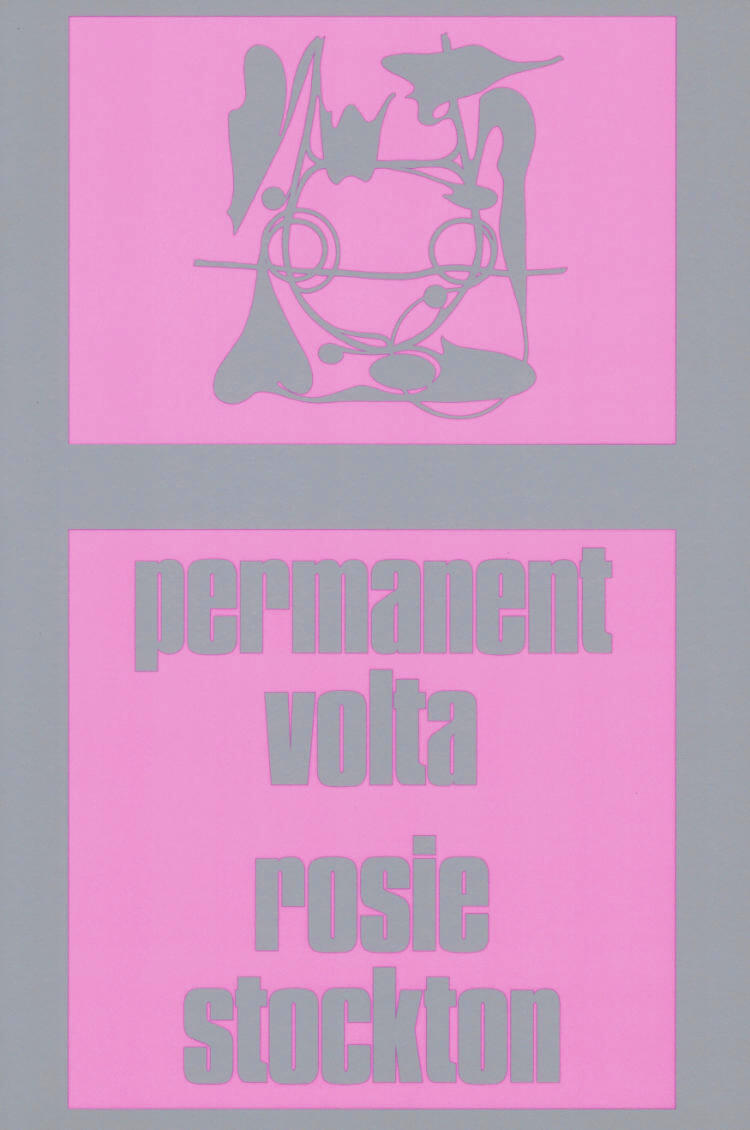
Permanent Volta
Permanent Volta is a book of poems about constraint and debt, as much as it is about excess, credit, loving luxury, and hating work. These are love poems about how queer intimacies invent political and poetic forms, how gender deviance imagines post-sovereign presents and futures.
Taking cues from Rosa Luxemburg's birdsongs and the syntax of invasive flowers, these poems strive to love lack. If history sees writers as tops and muses as bottoms, these poems are motivated by refusal, inversion, and evading representation. In Permanent Volta, the muses demand wages, and then they demand the world. Full of bad grammar, strange sonnets, and truncated sestinas, these poems are melancholy and militant, lazy and anti-state, greedy and collective.
Permanent Volta is for anyone motivated by the homoerotic and intimate etymology of comrade: one who shares the same room.
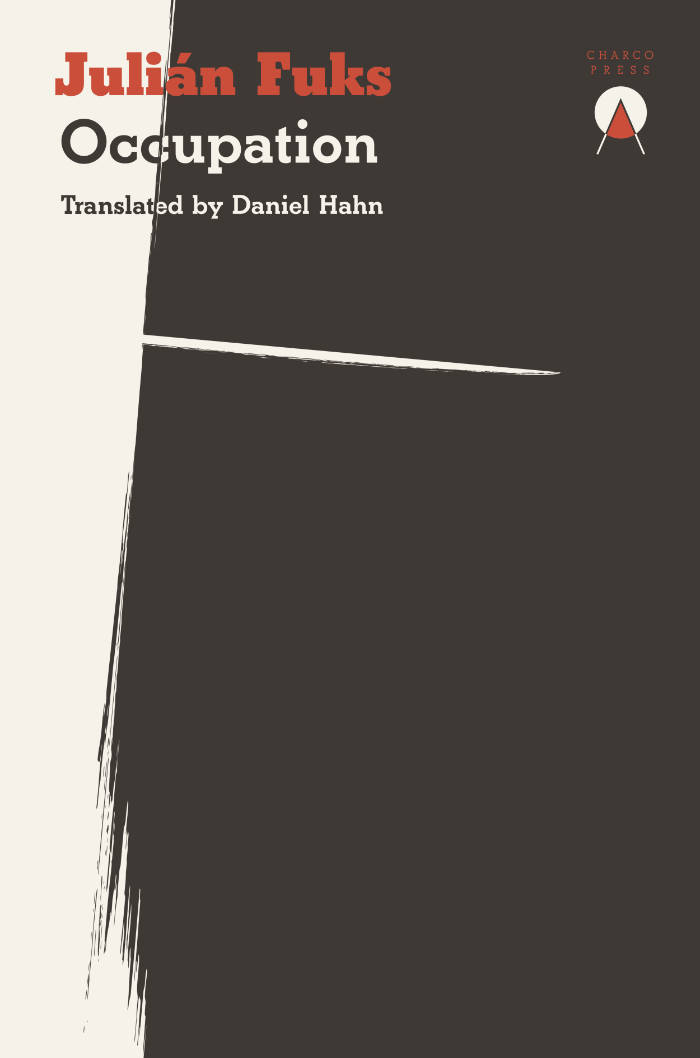
Occupation
Known and celebrated in Brazil and abroad for his novel Resistance, Julián Fuks returns to his auto-fictional alter ego Sebastián in a narrative alternating between the writer’s conversations with refugees occupying a building in downtown São Paulo, his father’s sickness, and his wife’s pregnancy. With impeccable prose, the author builds associations that go beyond the obvious, not only between glimpsing a life's beginning and end, but also between the building’s occupation and his wife's pregnancy — showcasing the various forms of occupation while exposing the frailty of life, the risk of solitude and the brutality of not belonging.
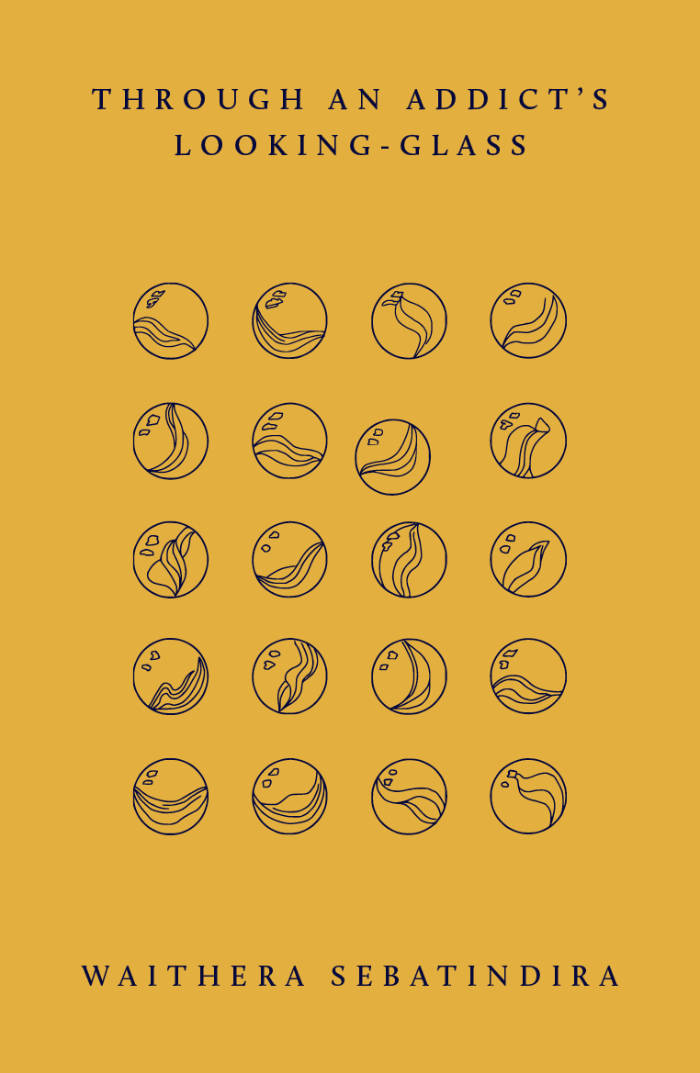
Through an Addict’s Looking-Glass
Through an Addict’s Looking-Glass is an exercise in meaning-making, a thinking-out-loud. Waithera Sebatindira unravels how it feels to live as an addict under capitalism, pondering how engaging with these experiences could bring the horizon of liberation towards us.
Through embodied explorations of addiction and recovery, Sebatindira invites us to inhabit crip time, a concept that describes different temporal realities in the lives of disabled people. In this collection, the addict’s crip time is distorted, mutable and non-linear, hopping backwards and forwards through memory loops and memory loss. Blackout is time travel; sobriety is failure; finitude, freedom.
An uncompromising rejection of the objectification of addicts across the political spectrum, this powerful meditation on illness, disability, solidarity and spirituality illuminates their indispensable contributions to the building of a new world.
Waithera Sebatindira is a Kenyan writer based in London. Their previous writing and research interests have included food imperialism, drag kings and gender transformation. They are a co-author of A FLY Girl’s Guide to University.

A Toast to St Martirià
A Toast to St Martirià is an improvised speech given by the cult Catalan filmmaker Albert Serra at the St Martirià fiesta in Banyoles, the town of his birth. Transmitting his subversive attitude and impulsive lust for life, it is a journey through his formative years and early relationships – established in the nightlife of his hometown – that have shaped his particular conception of cinema, art and life. ‘Cinema should be this, making perception of time and space more intense.’
Translated by Matthew Tree
Afterword by Alexander García Düttmann
The Catalan artist and filmmaker Albert Serra was born in 1975. His films usually depict European myths and literature. In 2001, he co-founded the production company Andergraun Films. His Honor of the Knights was selected by Cahiers du Cinéma as one of the ten best films of 2007. For Story of My Death, Serra was awarded the Golden Leopard at the Locarno Film Festival in 2013. For The Death of Louis XIV, Serra received the Prix Jean Vigo in 2016. Pacifiction was nominated for the Palme d’Or at the Cannes Film Festival in 2022.
Matthew Tree was born in London in 1958. He taught himself Catalan in 1979 and moved to Catalonia in 1984. Since then he has published nine works of fiction and non-fiction written in Catalan, and five written in English. He writes regular columns for Catalonia Today magazine in English and El Punt Avui newspaper in Catalan. He has translated works by Jordi Puntí, Maria Barbal, Monika Zgustová, Joel Joan, Marta Marín-Dòmine and Albert Serra, among others. Two of his English novels, Just Looking and Almost Everything, will appear in Catalan translation at the start of 2025.

Reseeding the library, gleaning readership
Afternoon Editions no. 1: an essay by Jeroen Peeters titled Reseeding the library, gleaning readership. In May 2017, Time has fallen asleep in the afternoon sunshine settled during three weeks in the Ravenstein Gallery in Brussels as part of the Kunstenfestivaldesarts. Invited as a writer in residence, Jeroen Peeters visited the library of living books on a daily basis and recorded his observations by hand in a notebook, which formed the basis for Afternoon Edition #1. Reseeding the library, gleaning readership is an essay on the seed library, on the dispersion of literature through wind, water and animals, on biodiversity and commoning at the heart of readership. On the cover a drawing by Wouter Krokaert of a Philodendron Xanadu. Published May 2018.

Afternoon Editions N°4: Certain Things
A day can be a composition not unlike an essay. Full of possibilities, full of limitations, bound by universal structures and marked by idiosyncratic desires. You go on walks. You read. You do your chores. All the while memory and other forms of imagination keep time with you. Books are strange companions; writing is a lonely thing rich with consolations.
Certain Things is a text by Claudia La Rocco, created with and through ideas such as these.
Published September 2022.
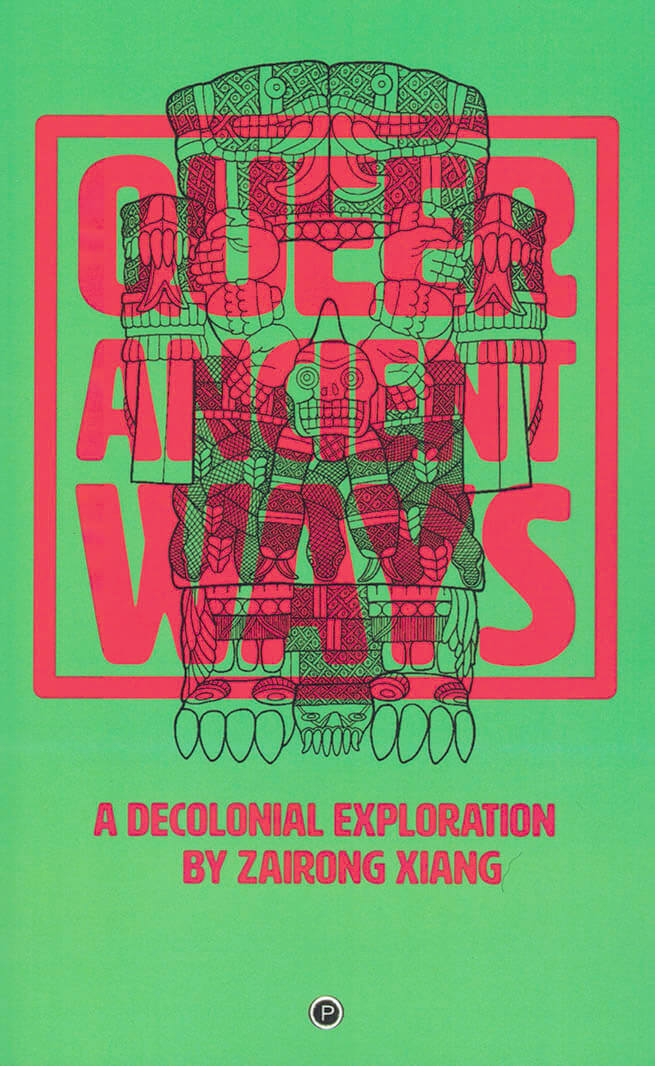
Queer Ancient Ways: A Decolonial Exploration
Queer Ancient Ways advocates a profound unlearning of colonial/modern categories as a pathway to the discovery of new forms and theories of queerness in the most ancient of sources. In this radically unconventional work, Zairong Xiang investigates scholarly receptions of mythological figures in Babylonian and Nahua creation myths, exposing the ways they have consistently been gendered as feminine in a manner that is not supported, and in some cases actively discouraged, by the texts themselves.
An exercise in decolonial learning-to-learn from non-Western and non-modern cosmologies, Xiang's work uncovers a rich queer imaginary that had been all-but-lost to modern thought, in the process critically revealing the operations of modern/colonial systems of gender/sexuality and knowledge-formation that have functioned, from the Conquista de America in the sixteenth century to the present, to keep these systems in obscurity.
At the heart of Xiang's argument is an account of the way the unfounded feminization of figures such as the Babylonian (co)creatrix Tiamat, and the Nahua creator-figures Tlaltecuhtli and Coatlicue, is complicit with their monstrification. This complicity tells us less about the mythologies themselves than about the dualistic system of gender and sexuality within which they have been studied, underpinned by a consistent tendency in modern/colonial thought to insist on unbridgeable categorical differences.
By contextualizing these deities in their respective mythological, linguistic, and cultural environments, through a unique combination of methodologies and critical traditions in English, Spanish, French, Chinese, and Nahuatl, Xiang departs from the over-reliance of much contemporary queer theory on European (post)modern thought. Much more than a queering of the non-Western and non-modern, Queer Ancient Ways thus constitutes a decolonial and transdisciplinary engagement with ancient cosmologies and ways of thought which are in the process themselves revealed as theoretical sources of and for the queer imagination.

My Mother Laughs (UK Edition)
In 2013, the filmmaker Chantal Akerman's mother was dying. She flew back from New York to Brussels to care for her, and between dressing her, feeding her and putting her to bed, she wrote. She wrote about her childhood, the escape her mother made from Auschwitz but didn't talk about, the difficulty of loving her girlfriend, C., her fear of what she would do when her mother did die. Among these imperfectly perfect fragments of writing about her life, she placed stills from her films. My Mother Laughs is both the distillation of the themes Akerman pursued throughout her creative life, and a version of the simplest and most complicated love story of all: that between a mother and a daughter.
Translated by Daniella Shreir with an introduction by Eileen Myles and afterword by Frances Morgan.

Octopus notes #11
Baptiste Pinteaux, Martin Laborde and 1 more
The eleventh issue of the journal-collection that brings together academic writings, interviews with artists, critical essays and artists' interventions in the form of inserts.
Featuring: Madalena Anjos, Zoe Beloff, Jean-Claude Biette, Vittoria Bonifati, Christine Burgin, Moyra Davey, Migle Dulskyte, Martha, Edelheit, Hélène Giannecchini, Donna Gottschalk, Birgit Hein, Gaëlle Hippolyte, Megan Hoetger, Jacques Julien, Sophie Lapalu, Sibylle de Laurens, Anne Lefebvre, Liz Magor, Andrea Mazzella, Marlene Monteiro Freitas, Zibuntas Miksys, Vali Myers, Gaspard Nectoux, Jeffrey Perkins, Elisa Pône, James Robert Baker, João dos Santos Martins, Giovanna Scotti, Samuel Steward, Billy Sullivan, Sabrina Tarasoff, Paul Thek, and a long previously unpublished conversation (50 pages) between Paul McCarthy and Sabrina Tarasoff.
Octopus notes is a journal that gathers critical essays, academic writing, interviews, archival documents and artists' projects since 2013. Each issue exists without a theme, but shapes echo through its content.

Mourn Baby Mourn
Mourn Baby Mourn explore la question du deuil et de la lamentation, tant intime que collective, à travers les états qu’ils génèrent. En trois actes pulsatoires, l’autrice pose les mots, massifs comme des parpaings ou les expulse, offensifs et spontanés tels des projectiles. Ce monologue parcourt les désordres émotionnels caractéristiques des temps contemporains, marqués par la nostalgie de futurs perdus. Dans ce texte-vortex hanté par les imaginaires et les visions discordantes d’un devenir collectif, l’écriture de soi est une existence agissante, et une résistance.
Le texte est issu de la pièce chorégraphique éponyme de Katerina Andreou créée en 2022.
Conception graphique : Angeline Ostinelli
Édité avec le soutien de BARK, du CCN-Caen en Normandie dans le cadre du dispositif artiste associé et de Charleroi Danse.

The Feminist Bookstore Movement
From the 1970s through the 1990s more than one hundred feminist bookstores built a transnational network that helped shape some of feminism's most complex conversations. Kristen Hogan traces the feminist bookstore movement's rise and eventual fall, restoring its radical work to public feminist memory. The bookwomen at the heart of this story—mostly lesbians and including women of color—measured their success not by profit, but by developing theories and practices of lesbian antiracism and feminist accountability.
At bookstores like BookWoman in Austin, the Toronto Women's Bookstore, and Old Wives' Tales in San Francisco, and in the essential Feminist Bookstore News, bookwomen changed people's lives and the world. In retelling their stories, Hogan not only shares the movement's tools with contemporary queer antiracist feminist activists and theorists, she gives us a vocabulary, strategy, and legacy for thinking through today's feminisms.

Thora
It’s 2009 and summer is encroaching on the town of Bellingen when Rhiannon is forced to move from her local high school to one in Coffs Harbour. Initially reluctant to leave behind her best friend Ellie, she quickly finds herself infatuated with the enigmatic Vanora. It’s only on befriending her, does she discover that like her, Vanora is a girl whose home life is shrouded in a web of secrets. Secrets that relate to her mother.
Set in the verdant Mid North Coast of New South Wales, Australia, Thora deals with family dysfunction, emancipation through friendship, and how girlhood is affected by the isolation of the country and the solace of nature.
Tilly Lawless is a queer, Sydney-based sex worker and writer. Her debut title Nothing But My Body was published in 2021.
Cover art by Rufus Shakespeare
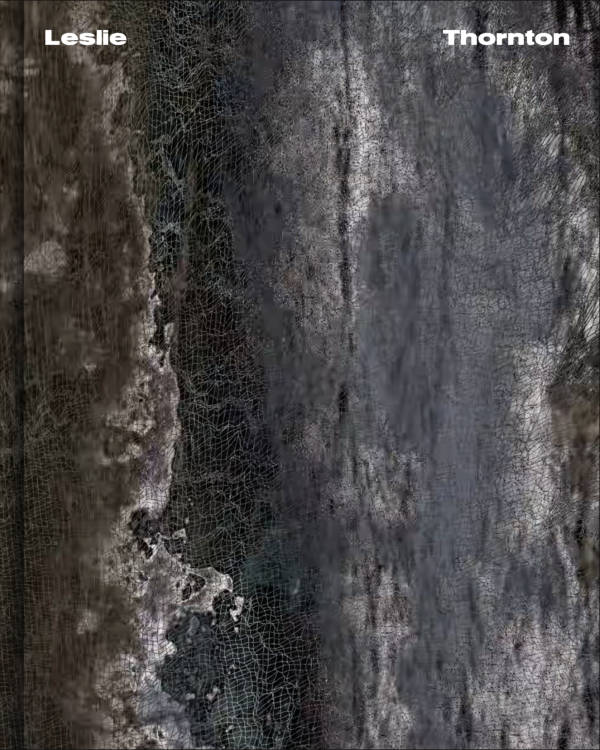
Leslie Thornton
Leslie Thornton, Natalie Bell and 2 more
Produced on the occasion of Leslie Thornton's major solo exhibition at the MIT List Visual Arts Center as well as a recent solo exhibition at Kunstverein Nurnberg, this richly illustrated volume is the first monograph on this important artist and filmmaker, offering essential, foundational scholarship on Thornton's influential work in film and video.
Since the mid-1970s, American avant-garde filmmaker and artist Leslie Thornton (born 1951) has produced an influential body of work in film and video. Thornton's early encounters with experimental, structuralist, and cinéma vérité traditions fueled her iconoclastic take on the moving image and gave shape to her practice of weaving together her own footage and voice with archival film and audio. In part through her forceful and dynamic use of sound, Thornton exposes the limits of language and vision in her works, while acknowledging the ways that language and vision nevertheless remain central to scientific discourse and narrative in general. Her work consistently interrogates modes of representation and the violence of looking, pushing beyond critiques of the gaze to consider biases in perception, or the way voice and sound can undermine an otherwise dominant visual narrative.

Being a Chair. Essays on Choreographic Poetry
Imagine words approaching a dance eyes closed or sleepwalking, words adrift beyond what can be envisioned beforehand, prompting writer and reader alike into a zone where time multiplies, where bodies grow footnotes and paper skin, savour the taste of language, attune their ears to the wavelength of blue. In a string of brief essays on her practice of writing choreographic poetry and scores, Janne-Camilla Lyster offers reflections on time, memory and the senses, on translation, punctuation and rhythm, on mistakes and crevasses, on the impossible and yet other things. What does it take to enter another form of existence, say, a chair?
Janne-Camilla Lyster is a writer, dancer and choreographer. She has published poetry, novels, essays and plays.

Archives on Show – Revoicing, Shapeshifting, Displacing – A Curatorial Glossary
Archives on Show brings the potential of reformulating the social and political relevance of archives by curatorial means into focus.
Based on the specific properties, faculties and methods of curation, the volume highlights those techniques and strategies that deal with archives not only to make their genesis and history apparent but also to open them up for the future. The 22 different ways of dealing with archives testify to the curatorial participation in (re)shaping the archival logic, structures and conditions. As process-oriented, collective and relational modes of producing meaning, these curatorial practices allow for the alteration, reconfiguration and mobilization of the laws, norms and narratives that the archive preserves as preconditions of its power.
The contributions to this volume by artists, curators and theorists demonstrate approaches that curatorially insist on building other relations between human and non-human archival participants. Each is using the book to create a curatorial constellation that generates and forms new connections between different times and spaces, narratives, disciplines and discourses. Configured as a glossary, the positions assembled in this volume exemplify curatorial methods with which to treat the archive as site and tool of collective, ongoing negotiations over its potential societal role and function.
Contributions by Heba Y. Amin, Talal Afifi, Eiman Hussein, Tamer El Said, Stefanie Schulte, Strathaus, Haytham El Wardany, Julie Ault, Kader Attia, Roger M. Buergel, Sophia Prinz, Yael Bartana, Rosi Braidotti, Kirsten Cooke, Ann Harezlak, Alice Creischer, Andreas Siekmann, Octavian Esanu, Megan Hoetger, Carlos Kong, Iman Issa, Kayfa ta, Kapwani Kiwanga, Doreen Mende, Stefan Nowotny, Marion von Osten, pad.ma, Abdias Nascimento, Eran Schaerf, Magdalena Tyżlik-Carver, Françoise Vergès.

as the non-world falls away
as the non-world falls away is set of fragmented poetic compositions, created through iPhone scans of the artists notebook that have then been worked over digitally, testing the boundaries between image and text in a palimpsestic manner
WITHOUT THE E is a series of pamphlets responding to a presence or an absence felt in contemporary digital culture.
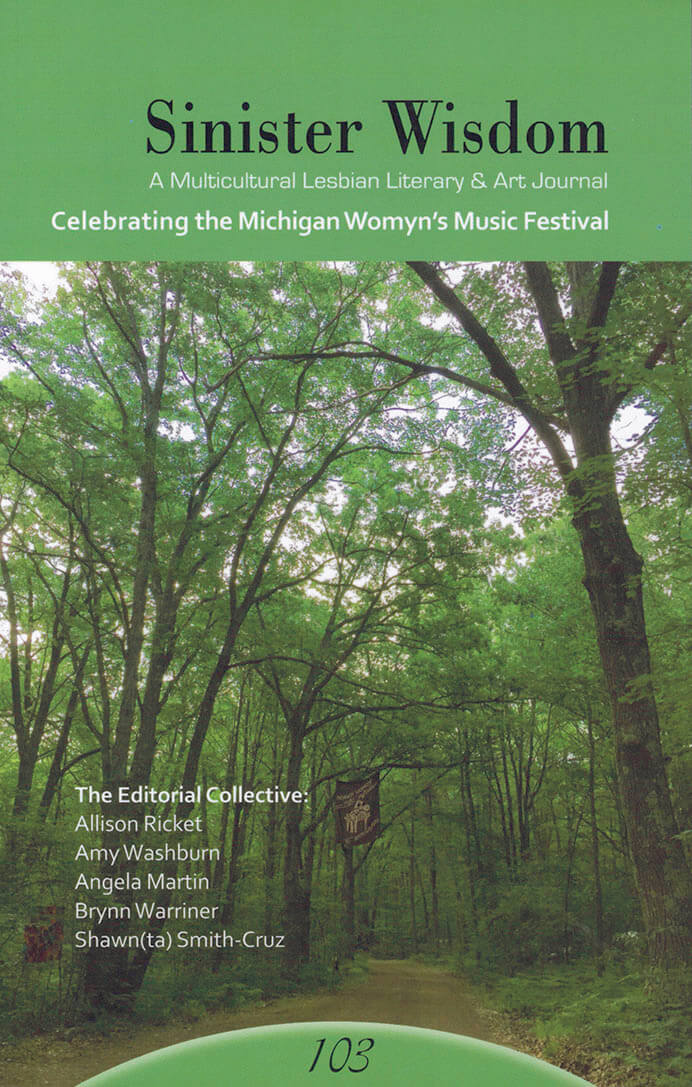
Celebrating the Michigan Womyn's Music Festival
Sinister Wisdom 103: Celebrating the Michigan Womyn's Music Festival honors the forty-year legacy of the Michigan Womyn’s Music Festival (1976–2015). Sinister Wisdom 103: Celebrating the Michigan Womyn's Music Festival celebrates this embodiment of radical feminist separatist collaboration, transformational self-defined autonomous spaces, a commitment to sisterhood and matriarchal culture, and a musical city sprung from the earth for one week in the woods.
A collective of five womyn each with a deep connection to Fest operated by consensus to create this issue. Striving to represent a range of womyn’s voices, values, traditions, and experiences of Fest, the collective highlighted what Fest has meant to generations of womyn, documented its chronology, and bore witness to the power of this community. Sinister Wisdom 103: Celebrating the Michigan Womyn's Music Festival includes womyn from multiple races, geographies, sexualities, generations, and gender and other social identities. Just as Fest brought together womyn from various backgrounds, our collection includes a range of artistic experience, from seasoned authors and photographers to those womyn new to publishing.
Sinister Wisdom 103: Celebrating the Michigan Womyn's Music Festival remembers the transformations, possibilities, and hopes for spaces cultivating the ongoing empowerment of womyn.
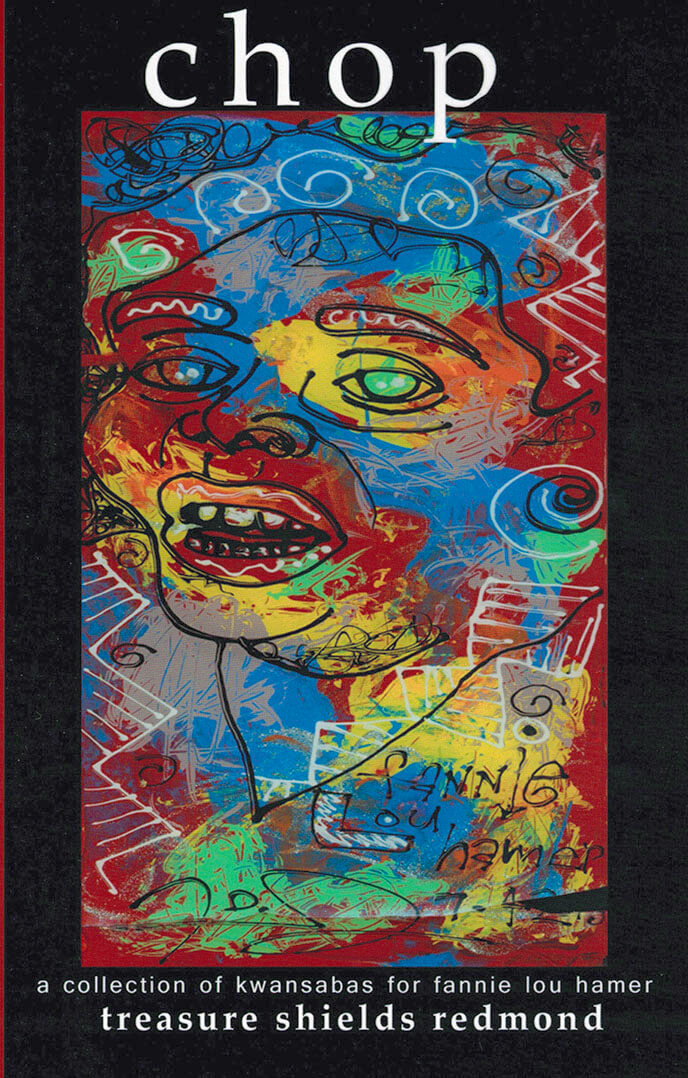
chop: a collection of kwansabas for fannie lou hamer
chop is a collection of poems that center on the life and work of proto-feminist and civil rights activist, Fannie Lou Hamer.
A Mississippi native, Treasure Shields Redmond is a poet, speaker, diversity and inclusion coach, and social justice educator. In 2016 she founded her company, Feminine Pronoun Consultants, LLC. Even though Treasure is completing a PhD in English Literature and Criticism, is a published writer, gifted veteran educator, and has spoken on stages all over the U.S. and in Europe, she uses her humble beginnings in the federal housing projects in Meridian, Mississippi to fuel her passion for helping college-bound families navigate college admissions painlessly and pro tably, and o ering perceptive leaders creative diversity and inclusion facilitation. Additional information on her poetry, writing, and multidimensional practice are available at: www.FemininePronoun.com.